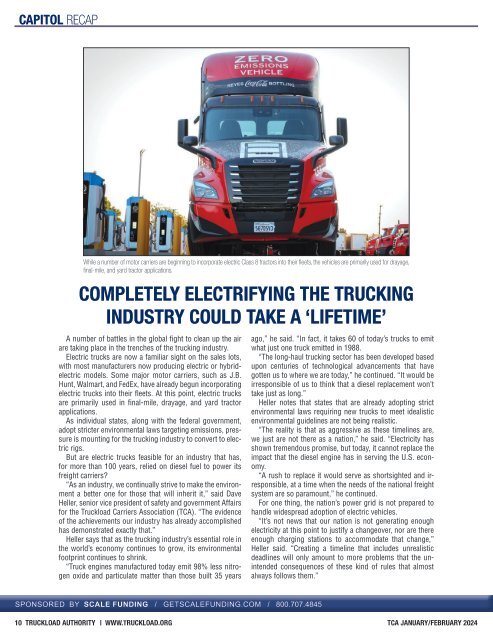TLA64_AllPages
You also want an ePaper? Increase the reach of your titles
YUMPU automatically turns print PDFs into web optimized ePapers that Google loves.
CAPITOL recap<br />
While a number of motor carriers are beginning to incorporate electric Class 8 tractors into their fleets, the vehicles are primarily used for drayage,<br />
final-mile, and yard tractor applications.<br />
Completely Electrifying the trucking<br />
industry could take a ‘lifetime’<br />
A number of battles in the global fight to clean up the air<br />
are taking place in the trenches of the trucking industry.<br />
Electric trucks are now a familiar sight on the sales lots,<br />
with most manufacturers now producing electric or hybridelectric<br />
models. Some major motor carriers, such as J.B.<br />
Hunt, Walmart, and FedEx, have already begun incorporating<br />
electric trucks into their fleets. At this point, electric trucks<br />
are primarily used in final-mile, drayage, and yard tractor<br />
applications.<br />
As individual states, along with the federal government,<br />
adopt stricter environmental laws targeting emissions, pressure<br />
is mounting for the trucking industry to convert to electric<br />
rigs.<br />
But are electric trucks feasible for an industry that has,<br />
for more than 100 years, relied on diesel fuel to power its<br />
freight carriers?<br />
“As an industry, we continually strive to make the environment<br />
a better one for those that will inherit it,” said Dave<br />
Heller, senior vice president of safety and government Affairs<br />
for the Truckload Carriers Association (TCA). “The evidence<br />
of the achievements our industry has already accomplished<br />
has demonstrated exactly that.”<br />
Heller says that as the trucking industry’s essential role in<br />
the world’s economy continues to grow, its environmental<br />
footprint continues to shrink.<br />
“Truck engines manufactured today emit 98% less nitrogen<br />
oxide and particulate matter than those built 35 years<br />
ago,” he said. “In fact, it takes 60 of today’s trucks to emit<br />
what just one truck emitted in 1988.<br />
“The long-haul trucking sector has been developed based<br />
upon centuries of technological advancements that have<br />
gotten us to where we are today,” he continued. “It would be<br />
irresponsible of us to think that a diesel replacement won’t<br />
take just as long.”<br />
Heller notes that states that are already adopting strict<br />
environmental laws requiring new trucks to meet idealistic<br />
environmental guidelines are not being realistic.<br />
“The reality is that as aggressive as these timelines are,<br />
we just are not there as a nation,” he said. “Electricity has<br />
shown tremendous promise, but today, it cannot replace the<br />
impact that the diesel engine has in serving the U.S. economy.<br />
“A rush to replace it would serve as shortsighted and irresponsible,<br />
at a time when the needs of the national freight<br />
system are so paramount,” he continued.<br />
For one thing, the nation’s power grid is not prepared to<br />
handle widespread adoption of electric vehicles.<br />
“It’s not news that our nation is not generating enough<br />
electricity at this point to justify a changeover, nor are there<br />
enough charging stations to accommodate that change,”<br />
Heller said. “Creating a timeline that includes unrealistic<br />
deadlines will only amount to more problems that the unintended<br />
consequences of these kind of rules that almost<br />
always follows them.”<br />
Sponsored by SCALE FUNDING / GETSCALEFUNDING.com / 800.707.4845<br />
10 Truckload Authority | www.Truckload.org TCA JANUARY/FEBRUARY 2024

















